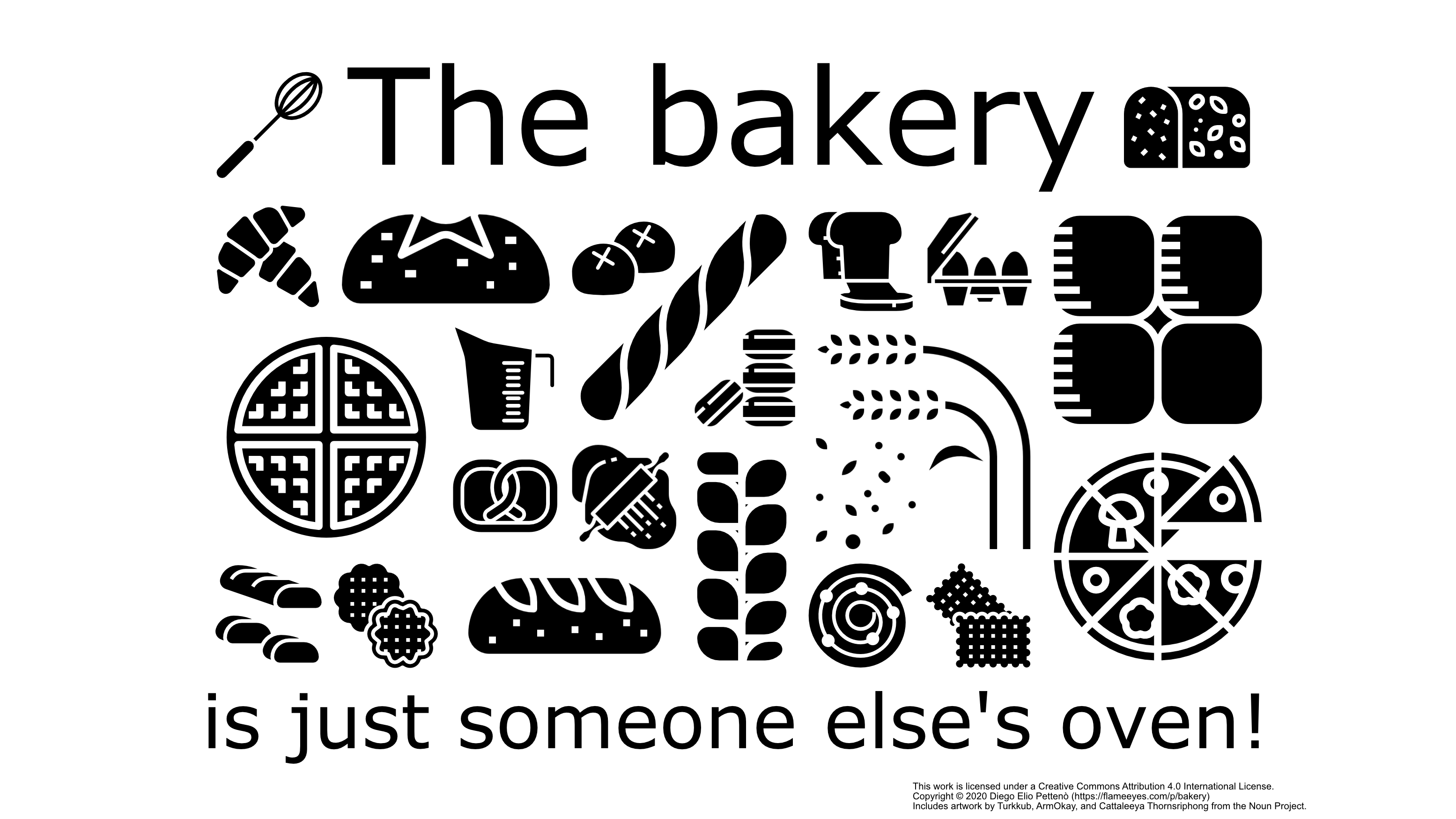
Most of the readers of this blog are likely aware of the phrase “The Cloud is someone else’s computer” — sometimes with a “just” added to make it even more judgemental. Well, it should surprise nobody (for those who know me) that I’m not a particular fan of either the phrase, or the sentiment within it.
I think that the current Covid-19 caused quarantine is actually providing a good alternative take on it, which is the title of the blog: “The bakery is just someone else’s oven.”
A lot of people during this pandemic-caused lockdown decided that it’s a good time to make bread, whether they tried it before or not. And many had to deal with similar struggles, from being unable to find ingredients, to making mistakes while reading a recipe that lead to terrible results, to following recipes that are just giving wrong instructions because they assume something that is not spelled out explicitly (my favourite being the recipes that assume you have a static oven — turns out that the oven we have at home only has “fan assisted” and “grill” modes.)
Are we all coming out of the current crisis and deciding that home baking is the only true solution, and that using a bakery is fundamentally immoral? I don’t think so. I’m sure that there will be some extremists thinking that, there always are, but for the most part, the reasonable people will go and accept that baking bread is not easy and while freshly baked bread can taste awesome, for most people, making time to do it every day would cut heavily into time that is needed for other things, that may or may not be more important (work, childcaring, wellness, …), so once the option of just buying good (or at least acceptable) bread from someone else becomes practical, lots of us will go back to buying it most of the time, and just occasionally baking.
I think this matches very well the way Cloud and self-hosted solutions relate to each other. You can set up your own infrastructure to host websites, mail servers, containers, Dockers, apps and whatever else. But most of the time this detracts from the time you would spend on something else, or you may need resources, that might not be linear to procure, or you may make mistakes configuring them, or you may just not know what the right tools you need are. While some (most) of these points apply to using Cloud solutions from various providers, they are also of a different level — the same way you may have problems following a recipe that includes bread as an ingredient, rather than being for bread.
So for instance, if you’re a small business, you may be running your own mail server. It’s very possible that you even already have a system administrator, or retain a “MSP” (Managed Service provider), which is effectively a sysadmin-for-hire. But would it make sense for you to do that? You would have to have a server (virtual or physical) to host it, you would have to manage the security, you would have to manage connectivity, spam tracking, logging, … it’s a lot of work! If you’re not in the business of selling email servers, it’s not likely that you’d ever get a good return on that resource investment. Or you could just pay FastMail to run it for you (see my post on why I chose them at the end).
Of course saying something like this will get people to comment on all kind of corner cases, or risks connected with it. So let’s be sure that I’m not suggesting that this is the only solution. There’s cases in which, even though it is not you primary business, running your own email server has significant advantages, including security. There are threat models and threat models. I think this is once again matching the comparison with bakeries — there are people who can’t buy bread, because the risk of whichever bread they buy to have been contaminated with something they are allergic to is not worth it.
If you think about the resource requirements, there’s another similar situation there: getting all the ingredients in normal situation is very easy, so why bother buying bread? Well, it turns out that the way supply works is not obvious, and definitely not linear. At least in the UK, there was an acknowledgement that “only around 4% of UK flour is sold through shops and supermarket”, and that the problem is not just the increase in demand, but also the significant change in usage pattern.
So while it would be “easy” and “cheap” to host your app on your own servers in normal times, there’s situations in which this is either not possible, or significantly inconvenient, or expensive. What happens when your website is flooded by requests, and your mail server sharing the same bandwidth is unreachable? What happens when a common network zero-day is being exploited, and you need to defend against it as quickly as reasonably possible?
Pricing is another aspect that appears to match fairly well between the two concepts: I heard so many complains about Cloud being so expensive that it will bankrupt you — and they are not entirely wrong. It’s very easy to think of your company as so big as to need huge complex solutions, that will cost a lot more than a perfectly fine solution, either on Cloud or self-hosted. But the price difference shouldn’t be accounted for solely by comparing the price paid for the hosting, versus the price paid for the Cloud products — you need to account for a lot more costs, related to management and resources.
Managing servers take time and energy, and it increases risks, which is why a lot of business managers tend to prefer outsourcing that to a cloud provider. It’s pretty much always the case, anyway, that some of the services are outsourced. For instance, even the people insisting on self-hosting solutions don’t usually go as far as “go and rent your own cabinet at a co-location facility!” which would still be a step short of running your own fiber optic straight from the Internet exchange, and… well you get my point. In the same spirit, the price of bread does not only include the price of the ingredients but also the time that is spent to prepare it, knead it, bake it, and so on. And similarly, even the people who I have heard arguing that baking every day is better than buying store bread don’t seem to suggest you should go and mill your own flour.
What about the recipes? Well, I’m sure you can find a lot of recipes in old cookbooks with ingredients that are nowadays understood as unhealthy — and not in the “healthy cooking” kind of way only, either. The same way as you can definitely find old tutorials that provide bad advice, while a professional baker would know how to do this correctly.
At the end of the day, I’m sure I’m not going to change the mind of anyone, but I just wanted to have something to point people at the next time they try the “no cloud” talk on me. And a catchy phrase to answer them by.

I did not know that convection ovens are called “fan-assisted” ovens. Wikipedia even argues that the term “convection” is a misnomer as conventional ovens use convection too. Interesting. I do not have one myself, but the convection ovens I have used will automatically adjust the temperature you enter into them so that you do not need to adjust the recipe you use by default.
The “grill” mode is probably broil mode.
The supply chain issue thing was an interesting thing to learn about during the pandemic. The store was low on baking ingredients (though I did not notice this as much personally) as everyone suddenly was baking. Selling much more meat and flour directly to consumers isn’t easy as the packaging process itself is different for consumer versus industry sales. For a couple weeks, the only cut of chicken I could find at the supermarket was drumsticks.
I agree that using cloud services makes sense for most people. Running a homeserver does let you learn some things you otherwise wouldn’t, though, but it is tiresome and ISPs have made it less viable these days. Using cloud services in a cost effective way does itself take some effort. I don’t really create things very much, but sometimes I dream x.x. The thing I fear the most about using a managed application platform is platform dependence or lock-in for things like storage APIs. For example, my friend has encouraged me to try DynamicDB. It would be cool to write something that runs in AWS Lambda (scaling down almost to 0 perhaps?) and I could get persistent state with a managed database. But it just feels weird to build something around specific services offered by a specific providers like that—even if it can be run in a dev environment. Hmm… There probably are abstractions around those things and I just need to do my research.